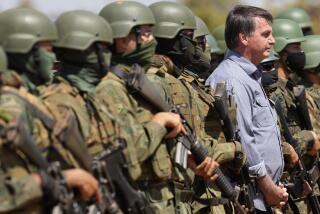‘If Peace Breaks Out’
- Share via
For a week I have followed the series examining prospects for a postwar Central America and I have noticed a blatantly obvious and disturbing current flowing among the various articles. The United States is the single largest obstacle preventing peace and maybe even “democracy” in that region. It is ironic that the U.S. which boasts of such a glorious democracy prevents and impedes the popular self-governing process of other countries. It is however, not unfathomable.
The U.S. maintains a high military involvement in the name of national security and does whatever it feels it must do to protect and preserve those interests.
Tracing back through American history one can easily note following war we experience what can be termed a postwar anxiety. It would stand to reason that now in the aftermath of Vietnam we could expect social tensions, nationalism and fear of communism to be running abnormally high.
The Reagan Administration has taken this fear to hysteric levels. It has diverted national attention from many issues and become the focus for our ever-more extensive involvement in the region. What about the threat of communism in Central America, is it really worth all this? It would appear that this flashing red word has clouded the minds of many and made this effort seem worth it. It would be nice if people could look at the facts.
Especially now in light of the Arias peace plan, the fact is that every one of the Central American nations is willing to work towards peace and reconciliation. The U.S. should practice what it preaches and respect popular will.
The U.S. has been pushing its self-interests in Central America for more than a century. Everything the U.S. has done has proved disastrous and has cost many lives in the process. We can afford to and should try to allow them to progress on their own and “give peace a chance.” I commend this series on its sound reasoning and can only desire that these ideas some day penetrate the thoughts of our leaders.
WARREN DERN
Los Angeles
More to Read
Sign up for Essential California
The most important California stories and recommendations in your inbox every morning.
You may occasionally receive promotional content from the Los Angeles Times.










